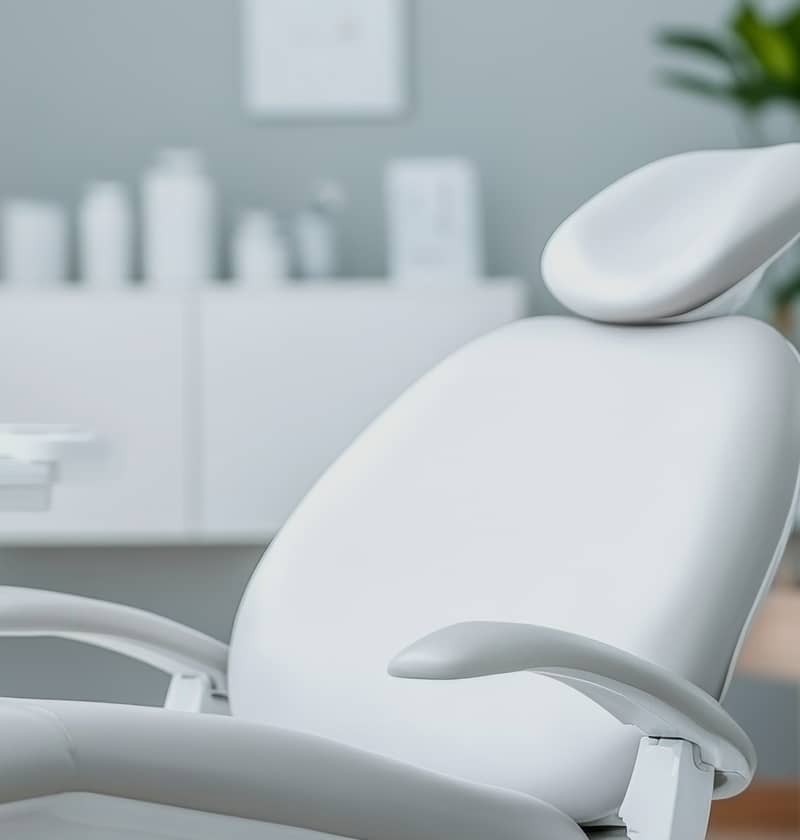

Are you experiencing persistent jaw pain, headaches, or clicking sounds when you open your mouth? You might be suffering from TMJ disorder, a common but often misunderstood condition that affects millions of Americans. At Briarcliff Dental Care in Briarcliff Manor, we provide personalized, effective treatments for TMJ/TMD that address not just the symptoms but the underlying causes of your discomfort.
What Is TMJ/TMD? Understanding Your Jaw Joint Pain
TMJ stands for the Temporomandibular Joint, the complex hinge connecting your jawbone to your skull. These joints, located on both sides of your face just in front of your ears, work together with muscles, ligaments, discs, and bones to help you speak, chew, and yawn.
TMD (Temporomandibular Disorder) occurs when these joints or the surrounding muscles experience dysfunction or inflammation. Unlike many dental conditions, TMJ disorders can affect your overall quality of life, causing symptoms that extend far beyond your mouth.
The impact of untreated TMJ disorders can be significant, affecting your ability to eat comfortably, speak clearly, or even concentrate during daily activities. Many patients suffer for years before seeking proper diagnosis and treatment, often mistakenly attributing their symptoms to other conditions.
Common Signs and Symptoms of TMJ Disorders
Recognizing TMJ/TMD early can prevent chronic pain and more serious complications. Be aware of these warning signs:
Pain Symptoms:
- Jaw pain or tenderness, especially when chewing
- Facial pain that may radiate to the neck and shoulders
- Frequent headaches or migraines
- Earaches or pain around the ear without infection
- Unexplained tooth pain or sensitivity
Functional Symptoms:
- Clicking, popping, or grating sounds when opening your mouth
- Jaw locking or limited ability to open your mouth wide
- Difficulty or discomfort while chewing
- Sudden changes in how your upper and lower teeth fit together
Many patients report that their symptoms worsen during periods of stress or after activities that strain the jaw, such as chewing gum or eating chewy foods. If you’re experiencing multiple symptoms, it’s important to seek professional evaluation.
What Causes TMJ Disorders?
TMJ disorders rarely have a single cause. Our Briarcliff Manor dental team looks for several potential contributing factors:
Teeth grinding and jaw clenching (bruxism) places excessive stress on your jaw joints and muscles, often occurring unconsciously during sleep or periods of stress. This repetitive pressure can lead to joint inflammation and muscle fatigue.
Misaligned bite (malocclusion) causes uneven pressure distribution across your jaw joints. When your teeth don’t fit together properly, your jaw muscles must work harder, potentially leading to strain and dysfunction.
Arthritis, particularly osteoarthritis or rheumatoid arthritis, can damage the joint’s cartilage and change how the joint moves. The jaw joints are susceptible to the same arthritic changes that affect other joints in your body.
Our Comprehensive Approach to TMJ/TMD Treatment
At Briarcliff Dental Care, we recognize that each case of TMJ/TMD is unique. Our treatment philosophy centers on identifying the specific causes of your discomfort and developing a tailored treatment plan using advanced diagnostic techniques.
First, we conduct a thorough evaluation including a detailed examination of your jaw movement, muscle tenderness, and bite relationship. When necessary, we utilize our state-of-the-art CBCT (Cone Beam Computed Tomography) imaging to get a detailed 3D view of your jaw joints and surrounding structures.
Based on our findings, we develop a personalized treatment plan that may include several approaches:
Custom Oral Appliances for TMJ Relief
For many patients, a custom-fitted oral appliance provides significant relief from TMJ symptoms. These specially designed devices work by:
- Repositioning your jaw to reduce joint strain
- Preventing teeth grinding and clenching during sleep
- Allowing inflamed tissues to heal by reducing pressure
- Stabilizing joint movement to prevent further damage
Our night guards are precisely crafted using our SprintRay 3D printer technology, ensuring a perfect fit that’s comfortable for nightly wear. Unlike over-the-counter options, our custom appliances are designed to address your bite issues and joint positioning.
Physical Therapy and Exercise Techniques
Physical therapy plays a crucial role in TMJ treatment by strengthening jaw muscles, improving joint mobility, and reducing inflammation. Our team can guide you through:
Gentle jaw exercises that improve range of motion and reduce stiffness without causing additional strain. These exercises, when done consistently, can significantly improve jaw function over time.
Massage techniques that target muscle groups to release tension and reduce pain. We’ll teach you how to perform these techniques at home to manage symptoms between appointments.
Proper posture habits that minimize strain on your jaw joints. Many patients don’t realize that forward head posture or hunching over devices can contribute to TMJ problems.
Advanced Treatments for Severe TMJ Disorders
For patients with more severe or persistent TMJ issues, we offer advanced treatment options:
BOTOX® Therapeutic injections can provide relief by relaxing overactive jaw muscles. This approach is particularly effective for patients whose TMJ pain stems primarily from muscle tension or spasms.
Occlusal adjustment procedures carefully modify your bite to distribute pressure more evenly across your teeth and jaw joints. These precise adjustments can dramatically improve comfort and function.
Restorative dental work including crowns, bridges, or orthodontics may be recommended to correct bite issues contributing to your TMJ disorder. Our comprehensive approach ensures that these treatments address both function and aesthetics.
Why Choose Briarcliff Dental Care for TMJ/TMD Treatment?
Our approach to TMJ/TMD treatment reflects our commitment to “Whole Body Dentistry,” recognizing that your oral health connects directly to your overall wellness. When you choose Briarcliff Dental Care for TMJ treatment, you benefit from:
A team with training in diagnosing and treating complex TMJ disorders. Our doctors stay current with the latest research and treatment approaches.
Advanced technology including CBCT imaging and the SprintRay 3D printer for creating precise oral appliances customized to your unique anatomy.
A boutique practice environment where we focus on one patient at a time, ensuring you receive our undivided attention during every visit.
Comprehensive care that addresses not just your symptoms but the underlying causes of your TMJ disorder, leading to more sustainable relief.
TMJ Treatment Timeline: What to Expect
Most patients wonder how long TMJ treatment takes to work. While everyone’s situation is different, here’s what you can generally expect:
| Treatment Phase | Timeline | What to Expect |
|---|---|---|
| Initial Relief | 2–4 weeks | Reduction in pain and discomfort as initial treatments begin working |
| Stabilization | 3–6 months | Improved jaw function, decreased frequency of symptoms |
| Complete Treatment | 1–3 years | Long-term management and resolution of underlying causes |
Treatment duration typically ranges from one to three years, depending on the severity of your condition and how your body responds to treatment. Factors that influence treatment time include:
- The underlying causes of your TMJ disorder
- How long you’ve been experiencing symptoms
- Whether there are complications like arthritis or disc displacement
- Your compliance with home care instructions and wearing prescribed appliances
Lifestyle Tips for Managing TMJ Symptoms
In addition to professional treatment, these self-care strategies can help manage TMJ symptoms:
- Apply moist heat or cold packs to the jaw area for 10-15 minutes to reduce pain and inflammation
- Eat softer foods and cut food into smaller pieces to reduce jaw strain
- Avoid extreme jaw movements like wide yawning or gum chewing
- Practice stress-reduction techniques like meditation or deep breathing
- Maintain good posture, especially when working at a computer
- Be mindful of jaw clenching during the day and practice keeping your jaw relaxed
These simple habits can significantly complement your professional treatment plan and help prevent symptom flare-ups.
Frequently Asked Questions About TMJ/TMD
How Do I Know if My Headaches Are Related to TMJ Disorder?
TMJ-related headaches typically occur alongside other symptoms like jaw pain, clicking sounds, or difficulty opening your mouth wide. These headaches often concentrate in the temples, forehead, or back of the head and may worsen when chewing or after waking up. During your evaluation at Briarcliff Dental Care, we can help determine if your headaches are connected to jaw joint dysfunction by examining your bite, jaw movement patterns, and muscle tenderness around the temporomandibular joints.
Will My Dental Insurance Cover TMJ Treatment?
Insurance coverage for TMJ disorders varies significantly between providers and plans. Some dental insurance plans cover diagnostic procedures and conservative treatments like custom oral appliances, while medical insurance might cover more advanced interventions. At Briarcliff Dental Care, our administrative team works closely with you to maximize your benefits and explain all costs before treatment begins. For patients without insurance coverage, our BDC Membership Plan offers an affordable alternative to help manage treatment costs.
Can Children Develop TMJ Disorders?
Yes, children and adolescents can develop TMJ disorders, though they’re less common than in adults. Contributing factors may include teeth grinding, jaw injury, orthodontic issues, or congenital jaw misalignment. Early intervention is especially important for younger patients to prevent long-term complications and ensure proper jaw development. Our team is trained in diagnosing and treating TMJ issues in patients of all ages with gentle, age-appropriate approaches.
Is Surgery Ever Necessary for TMJ Treatment?
Most TMJ disorders respond well to conservative, non-surgical treatments like those we offer at Briarcliff Dental Care. Surgery is typically considered only after other treatment options have been exhausted, and is reserved for conditions like severe joint damage or structural abnormalities. Our philosophy emphasizes starting with the least invasive treatments first. If your condition might benefit from surgical intervention, we coordinate with other providers to ensure you receive appropriate care.
How Do Stress and Anxiety Affect TMJ Disorders?
Stress and anxiety can significantly impact TMJ disorders by increasing muscle tension, promoting teeth clenching and grinding, and lowering your pain threshold. Many patients notice their symptoms worsen during stressful periods. As part of our whole-body approach to dentistry, we discuss stress management techniques as an important component of your treatment plan and may recommend complementary approaches like relaxation exercises, physical therapy, or referral to other healthcare providers when appropriate.
Take the First Step Toward TMJ Pain Relief at Briarcliff Dental Care
Don’t let jaw pain, headaches, and limited function affect your quality of life. Our team at Briarcliff Dental Care is ready to help you find relief from TMJ/TMD symptoms with personalized, effective treatment approaches.
Visit us at 540 N. State Road, Suite 5, 2nd Floor, Briarcliff Manor, NY 10510 or call (914) 941-1639. You can also request an appointment online today. Restore comfort, function, and peace of mind with TMJ treatment at Briarcliff Dental Care – your partner in whole-body wellness.
Meet Our Experienced Dentists in Briarcliff Manor

Dr. Ehrmann received her Doctor of Dental Surgery from NYU College of Dentistry and completed advanced education in General Dentistry at Hudson Valley Hospital. Her areas of expertise include Cosmetic Dentistry, General Dentistry, Family Dentistry, and management of Dental Anxiety and Phobia.

Dr. Nicole Jackson earned her DMD from Rutgers School of Dental Medicine and completed her residency training at Westchester Medical Center, a Level-1 trauma hospital. She is passionate about all aspects of general dentistry, including Cosmetic Dentistry, Invisalign®, Endodontics, Prosthodontics, Periodontics, and Oral Surgery. Dr. Jackson is an AAFE-Certified Injector for Botox and Dermal Fillers, and is committed to providing honest, high-quality care.
Briarcliff Dental Care
540 N. State Rd. Suite 5,
2nd Floor Briarcliff Manor,
NY 10510
Mon-Thurs: 8AM-5PM
Fri-Sun: Closed
Schedule Your Consultation at Briarcliff Dental Care
Transform your health journey with dentistry that sees beyond your smile. At Briarcliff Dental Care, we recognize the profound connection between oral health and your overall wellbeing. It’s not just about treating teeth, but caring for the whole person. Our comprehensive approach integrates advanced dental techniques with holistic health principles, addressing the root causes of issues rather than just symptoms.
Experience the difference with our complimentary consultation where we’ll listen to your concerns, thoroughly evaluate your oral health, and create a personalized treatment plan that supports your complete wellness goals. Whether you’re seeking preventative care, restorative solutions, or a complete smile transformation, our compassionate team is ready to guide you every step of the way. Contact us today to schedule your appointment and take the first step toward a healthier mouth and a healthier you. Your journey to complete wellbeing starts at Briarcliff Dental Care.